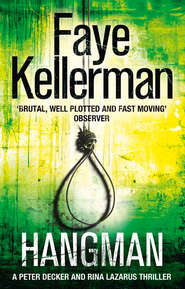По всем вопросам обращайтесь на: info@litportal.ru
(©) 2003-2025.
✖
Peter Decker 2-Book Thriller Collection: Blindman’s Bluff, Hangman
Автор
Год написания книги
2019
Настройки чтения
Размер шрифта
Высота строк
Поля
Marge rubbed her hands. “Can we arrest someone based on a voice identification?”
“I don’t know, but we can certainly ask about the crimes. If you pick either of them up for … let’s say drug dealing … maybe we can use those charges as leverage to find out what he knows about the Kaffey murders.”
“And are we sure that Harriman can pick out the correct individual just from hearing his voice again?”
“No, which is why I’m going to set him up with a couple of stooges. Harriman said the accents pointed to someone from Mexico and someone from El Salvador. I’ll voice print a couple of guys here who come from Mexico and El Salvador. If Harriman picks them out, then we’ll know he’s not reliable as a voice witness. That way, if you arrest either of Rina’s guys from the mug book, we’ll have a control group already in place.”
“I’ll talk to Oliver. We’ll work something out.”
“We’ve also got to find Joe Pine. He lives in Pacoima.”
“I know that. We can’t find him.”
“His family may be from Mexico so maybe he’s there. Try the name José Pinon. Work on this even if it means overtime. I’m sorry, but this case is just too important for a nine-to-five stint.”
“Don’t worry about it. Vega’s not home anymore, and Oliver isn’t the stud he used to be. We both have some empty slots on our calendars. You know how it is. Sometimes a night of surveillance is better than a night home alone with nothing but the idiot box for company.”
After being fed and caffeinated, the group looked sharp. Decker started by recapping the interview that he and Willy Brubeck had with Milfred Connors. “Before we get into the lawsuit between the brothers, I’d like to know about the financials now. Lee, why don’t you start?”
Wang paged through his notes. “Kaffey Industries has current book value of around 600 million dollars, down from its high at 1.1 billion at the height of the real estate boom. It was delisted from the New York Stock Exchange about five years ago when the family bought back the outstanding shares.”
“Around the time of the brothers’ lawsuit,” Brubeck noted.
“Makes sense,” Wang said. “From my reading, I got the feeling that Guy didn’t want anyone peeking into the books. He had made statements in magazines, saying we’re now doing it our way and we no longer give a damn about anyone else’s opinion.”
“Who in the family holds what?” Marge asked.
“Guy has 80 percent of common stock, each son has 9.5 percent, and Mace has 1 percent.”
“So Guy controlled everything,” Oliver said.
“It was his baby and he was always in control.”
Drew Messing broke in. The southern boy’s hair was slightly mussed up, his suit just shabby enough to give him that TV detective’s contrived down-and-out but handsome look. “I’d like to point out from my reading that Guy was one feisty fellow. His sudden outbursts were legendary. He blew up at anyone who he felt was disrespecting him. I found this article on the Web where Guy got into an altercation with a parking valet that resulted in fistfights. There was a lawsuit, but it was settled.”
Oliver said, “You have copies of that?”
“I’ll make you a copy.”
“What about blowups within the company?”
“Didn’t find anything that came to blows, but he certainly screamed a lot,” Messing said. “On the flip side, he was the darling of the charities. He gave away millions to all sorts of charities.”
“Including ones that rehabilitated gang members,” Decker pointed out. “The man had odd tastes in alms.”
Wynona said, “Is it just me or does anyone else find it interesting that Mace still has 1 percent of the stock? You’d think he wouldn’t get anything if Guy seriously thought he was embezzling from the company.”
“My thoughts exactly,” Decker said. “I’m sure Mace was embezzling, but I bet Guy wasn’t squeaky clean either.”
Wang checked his notes. “When the company first went public, Guy had 56 percent of the shares with the rest of the 20 percent shared equally between his sons and Mace and the rest sold in common stock. Then there was the lawsuit. Guy accused Mace of embezzling funds. Mace countered by saying that Guy had made some poor investments and was trying to hide his screwups by pinning the company’s downturn on him.”
Lee paused.
“No mention of Mace saying that Guy embezzled, but it certainly appears that both had something to hide because they settled and were still working together.”
“But Mace was demoted,” Brubeck pointed out.
“True,” Wang said. “Mace resigned from the board of directors and agreed to give Guy 5.33 percent of his stock in exchange for the suit being dropped. But Mace also retained his current salary and was given the title of executive vice president. He was also allowed to be present at all the board meetings even if he wasn’t part of the board.”
Decker said, “Mace lost the most, but not everything. Maybe Connors was right. Maybe Guy was embezzling also.”
Oliver said, “Is the company in trouble?”
“They’re not public so it’s hard to get information,” Wang said. “They’re property heavy. In this downturn, that’s not a good thing. And I’ve read that their cash flow is extremely tight because of the Greenridge Project. Mace and Grant were hoping to get a new influx of money by raising some municipal bonds—some redevelopment agency. The problem is that in order to get a decent credit rating, the bonds have to be backed by something tangible. With land and property values plummeting, there have been some innuendos that their assets aren’t enough to carry the size of the debt. So either they have to raise the interest rate or shrink back the offering.”
“Meaning the Greenridge Project is in danger?” Brubeck said.
Wang said, “Some say it’s better to finish up the project, others say cut the losses and sell the land. Plus they’ve had to make a lot of concessions to win over the naysayers. Every time that happens, it’s money taken out of the profit till.”
Decker asked, “What’s the bottom line?”
“It’s hard to put a bottom line, Lieutenant. Kaffey’s doing well in some areas, but Greenridge is taking a bite out of the profits. Whether it’ll ultimately be a boon or a boondoggle, who knows?”
“What about Cyclone Inc.?” Marge asked. “Mace made a point of telling the lieutenant and me that the CEO—Paul Pritchard—was out to get him.”
“He’s very small time compared to Kaffey,” Wang said. “His competing mall—Percivil—is old and downscale, with stores like Bizmart and Dollars and Sense. It’s about five miles from Greenridge and while it’s true that Greenridge would have an impact on that mall, it certainly wouldn’t be in the same class.”
Decker said, “So the rivalry might be a convenient invention on Mace’s part.”
Wang said, “Maybe, but maybe not. I found an article quoting Pritchard, who says that the Greenridge Project was overkill. He went on to say that he wasn’t worried. To me that means he is worried. I haven’t connected with him yet, but I’ll keep at it.”
“I’m still back at the brothers’ suing each other,” Brubeck said. “Any way to find out what was in the court documents?”
“Not officially, but there are often unnamed sources who leak out information,” Wang said. “If we’re looking for someone who held a grudge against Guy, I guess Mace is as good as anyone. But Mace is still with the company. Something happened behind the scenes.”
“Both of them were taking money off the top,” Oliver said.
“At least Mace was giving some of it back to his employees,” Brubeck added. “If Connors is believable.”
“Connors definitely had a warm spot in his heart for Mace,” Decker said. “While I’m sure Mace likes his money, I bet he also enjoyed being the darling to the employees.”
“Yeah, didn’t Connors say that he went to Mace because he had a soft spot that Guy didn’t have?”
“Or maybe Mace was biding his time,” Oliver said. “Nursing a grudge can be fun stuff.”
“That’s always a possibility,” Messing said.
“What about the sons?” Wanda Bontemps asked. “Any sense of rivalry between the sons and the dad?”











